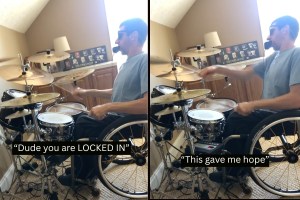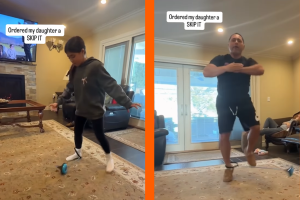“Young, strong, vibrant, unadorned, and beautiful.”
These are just a few of the words Karen Hill used to describe Harriet Tubman in this rare photograph, presumed to be taken shortly after the Civil War in Tubman’s adopted hometown of Auburn, New York.
A previously unrecorded photograph of Harriet Tubman. Image via the Swann Gallery.
Tubman rarely sat for photographs, as her life’s work required her to hide from bounty hunters and others wishing to do her and the movement harm. As such, very few images of her exist, especially from her younger years. This image of Tubman, likely in her mid- to late-40s, was previously unrecorded … until now.
The photo is just one part of a lot heading to auction March 30, 2017. Hill, the president and CEO of the Harriet Tubman Home, wants the picture back where it belongs.
The rare photograph was found in a centuries-old carte de visite album belonging to Emily Howland, an educator and abolitionist.
Carte de visites are small images (around 2″ x 3.5″) mounted on thick paper. Because of their small size, they were often traded among friends and visitors.
Howland’s album also includes 44 other photographs that appear to be in good condition, including the only known portrait of John Willis Menard, the first black man elected to the House of Representatives (although his opponent’s opposition to the election prevented Menard from being seated).
On the right, Howland’s carte de visite album. On the left, an album page featuring John Willis Menard. Images via the Swann Gallery.
Given the truly exceptional images and their condition, the lot is estimated to sell for $25,000 to $30,000.
Private collectors will jump at the chance to own such a rare piece of history, but there’s only one place a piece like this belongs: the Harriet Tubman Home.
In 1859, Harriet Tubman purchased a piece of land outside Auburn, New York, a community known for progressive thought and abolition. Tubman and the family members she emancipated made their home there, and the Auburn land became a true safe haven. In early 1903, despite financial trouble, Tubman donated some of her land to the African Methodist Episcopal Church, who used it to found the Harriet Tubman Home for the Aged.
The Harriet Tubman Home for the Aged. Photo by Lvklock/Wikimedia Commons.
Today, through a nonprofit group, the AME Zion Church keeps Tubman’s spirit of determination and ingenuity alive through the management of the Harriet Tubman Home. Visitors can take a guided tour of Tubman’s Home for the Aged, see the exterior of her personal home, your the 32-acre homestead, and see up to 60,000 artifacts representing her life and mission. Congress even made the property and land a National Historical Park in 2014.
To preserve Tubman’s legacy and ensure the photo is available to the public, the Harriet Tubman Home is raising money to #BringHarrietHome.
The Harriet Tubman Home launched a fundraising campaign to raise a minimum of $25,000 in order to be competitive bidders at the upcoming auction. With 13 days to go as of this writing, the group has raised around $21,000.
“While we can appreciate that the finder’s compensation for discovering and sharing this photo of Harriet Tubman is warranted, we are resolute in our belief that there is no dollar amount that can match the incalculable value that will come from having it properly preserved in our archives at her home in Auburn,” read the group’s Women You Should Fund page.
Harriet Tubman via the Swann Gallery.
Should the Harriet Tubman Home be outbid, donors can rescind their contribution or donate to the Harriet Tubman Home to fund volunteer training and restoration efforts to the home.
The residence Tubman shared with her husband, Nelson Davis. Davis laid the bricks himself, but they’re in desperate need of restoration. Image via Women You Should Know/YouTube.
This is your chance to say thank you.
Harriet Tubman dedicated her life to selfless service — guiding slaves to freedom, working as a spy, cook, and nurse and armed scout for the Union, then donating her land to the church to help the elderly. She did all of this not for praise or acclaim, but because she knew in her heart it was right.
This is right too.
As painful as it is to think of Harriet Tubman on the auction block more than 100 years after her death, we can each do our part to help preserve this piece of her legacy for generations to come. This is a rescue mission. It’s time to return the favor.
Watch the powerful video from the Harriet Tubman Home and donate or share to #BringHarrietHome.


























































